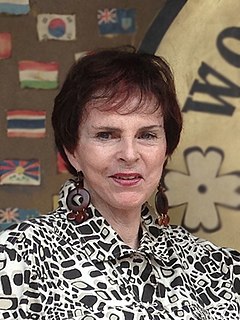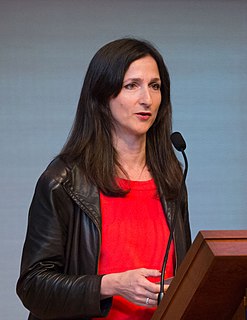A Quote by M. King Hubbert
The steep ride up the and down the energy curve is the most abnormal thing that has ever happened in human history. Most of human history is a no-growth situation. Our culture is built on growth and that phase of human history is almost over and we are not prepared for it. Our biggest problem is not the end of our resources. That will be gradual. Our biggest problem is a cultural problem. We don't know how to cope with it.
Related Quotes
The problem that faces us is the problem of awakening. What we lack is not an ideology or doctrine that will save the world. What we lack is mindfulness of what we are, of what our situation really is. We need to wake up in order to rediscover our human sovereignty. We are riding a horse that is running out of control. The way of salvation is a new culture in which human beings are encouraged to rediscover their deepest nature.
The future of nations cannot be frozen . . . cannot be foreseen. If we are going to accomplish anything in our time we must approach our problem in the knowledge that there is nothing rigid or immutable in human affairs. History is a story of growth, decay and change. If no provision, no allowance is made for change by peaceful means, it will come anyway - and with violence.
War is a great destroyer. And human history has arrived at a pivotal moment. We can choose a path built on cooperation, where our caring and sharing side uplifts us, or we can continue to embrace a worldview where domination using violence imprisons us in cycles of killing and destruction. I'm a biologist, and war is not genetically fixed. War is a cultural invention. It's time to end this abomination, and this World Beyond War movement is uniquely focused on unifying the human community to create one of the biggest revolutions in history. I'm in. Join us!
For an economy built to last we must invest in what will fuel us for generations to come. This is our history - from the Transcontinental Railroad to the Hoover Dam, to the dredging of our ports and building of our most historic bridges - our American ancestors prioritized growth and investment in our nation's infrastructure.
An observer will see the bizarre developments of behavior only in alien cultures, not his own. Nevertheless this is obviously a local and temporary bias. There is no reason to suppose that any one culture has seized upon an eternal sanity and will stand in history as a solitary solution of the human problem. Even the next generation knows better. Our only scientific course is to consider our own culture, so far as we are able, as one example among innumerable others of the variant configurations of human culture.
There is a major problem of unsustainability of our environment, and we're seeing it in our natural resources, peak oil is probably upon us, and it can't be sustained. We're on an unsustainable path, and at this point in history we are responsible for that. We're going to have to change our ways. We're going to have to think through this problem.
I think the problem is these basic sort of human values from our - from the beginning, from birth, are not sort of properly nurtured. So then our mind, our brain, through education and also difference of experiences, that eventually, these basic values or what are called dominant, not have the catching up our intelligence, experience growth, that also should grow. Then our life become more human.
Here I had tried a straightforward extrapolation of technology, and found myself precipitated over an abyss. It's a problem we face every time we consider the creation of intelligences greater than our own. When this happens, human history will have reached a kind of singularity - a place where extrapolation breaks down and new models must be applied - and the world will pass beyond our understanding.
We stand on a great threshold in the human history of space exploration. If life is prevalent in our neighborhood of the galaxy, it is within our resources and technological reach to be the first generation in human history to finally cross this threshold, and to learn if there is life of any kind beyond Earth.
The history of science, like the history of all human ideas, is a history of irresponsible dreams, of obstinacy, and of error. But science is one of the very few human activities-perhaps the only one-in which errors are systematically criticized and fairly often, in time, corrected. This is why we can say that, in science, we often learn from our mistakes, and why we can speak clearly and sensibly about making progress there. In most other fields of human endeavour there is change, but rarely progress ... And in most fields we do not even know how to evaluate change.
[Suburbia] represents, after all, the greatest misallocation of resources in the history of the world. We built it during our most affluent period of history, and in the decades to come we will be comparatively destitute collectively. In short, we will not have the resources to retrofit most of suburbia.































